News
The Sacred Intersection: Ouidah’s Catholic Church and Python Temple
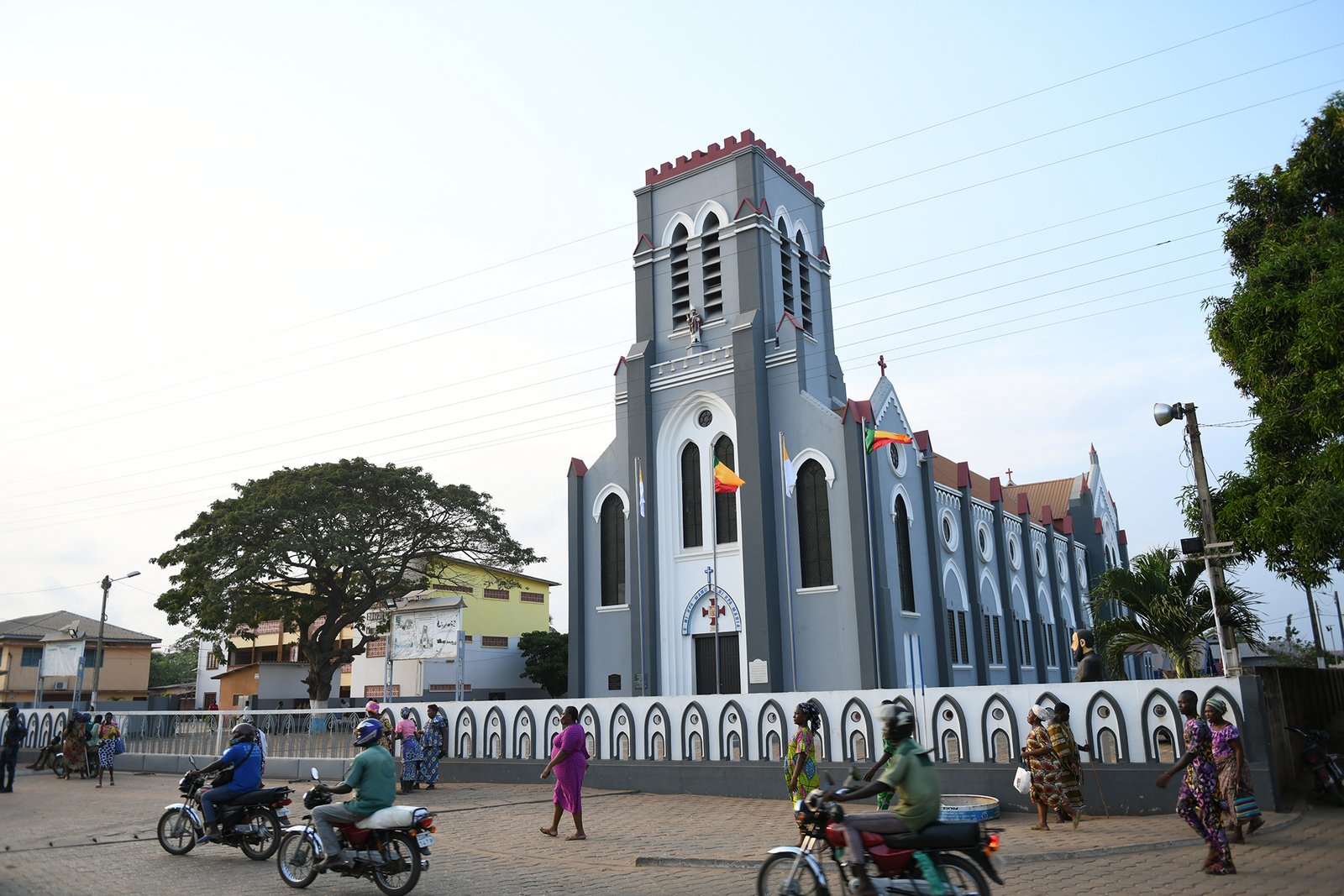
The Sun Hung Low over the ancient town of Ouidah, casting a golden shade over the baobab tree, I walked the short distance separating two landmarks that symbolise the soul of Benin.
On one side stood the imposing Basilica of the Immaculate Conception, a testament to colonial-era Christianity. On the other, the modest yet spiritually charged Python Temple, the cradle of Voodoo reverence.
This striking juxtaposition embodies a story of coexistence, resilience, and cultural syncretism.
seated by his shrine
room with a cross hanged at the entrance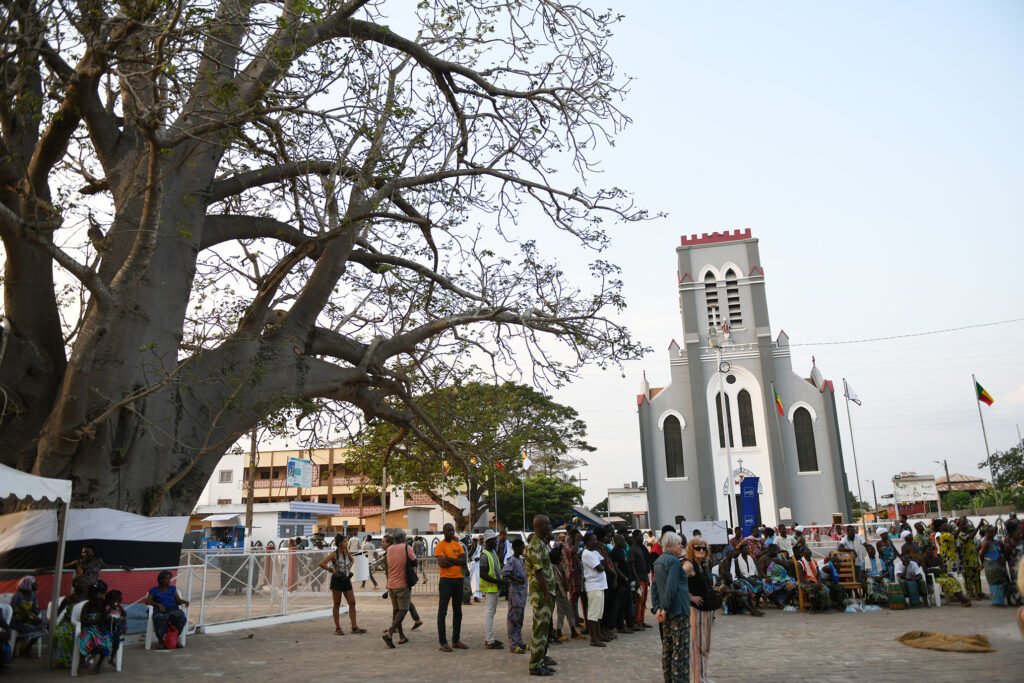
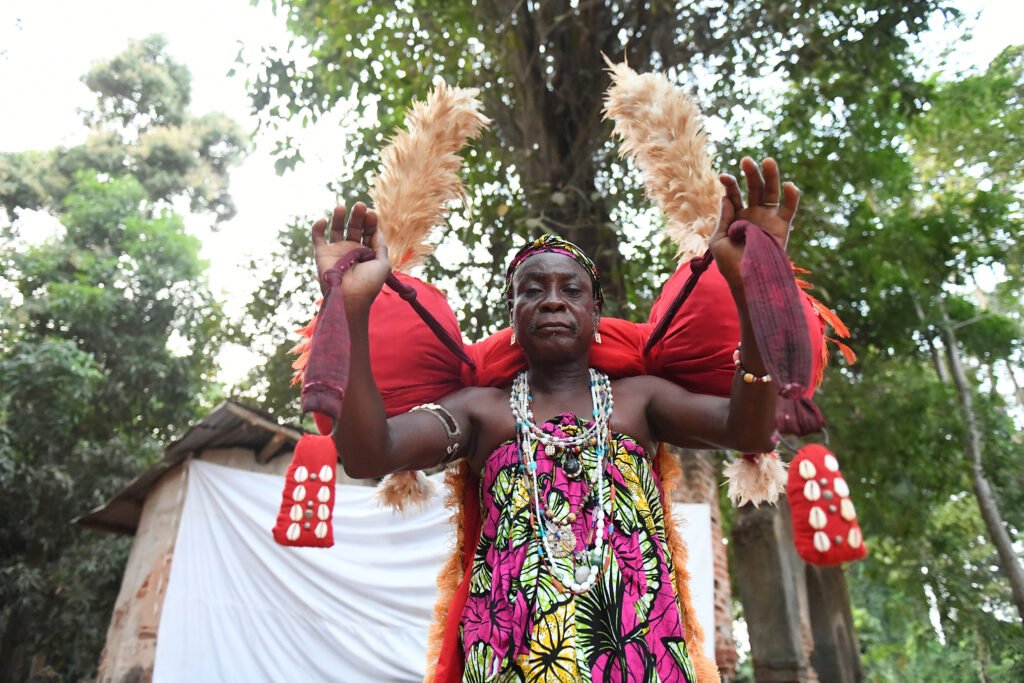

temple with the catholic church
Ouidah, a small coastal town in southern Benin, is a place where two spiritual worlds intertwine.
The Catholic Church, introduced during Portuguese expeditions in the 16th century and later reinforced by French colonial rule, brought Christianity to the region.
The basilica’s grandeur speaks to this legacy, its stained-glass windows and towering steeples reflecting the influence of European architects.
Just a few steps away, the Python Temple offers a contrasting narrative—one deeply rooted in Benin’s indigenous spirituality.
Infront of the python temple
•Some traditionalists performing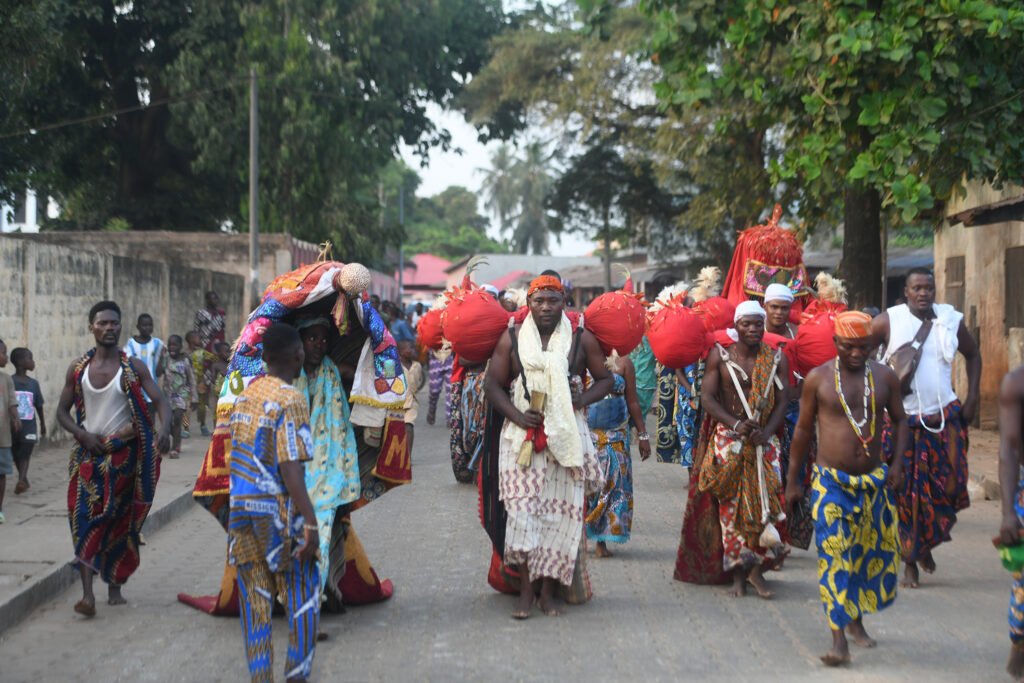
procession with their emblems behind them
the Catholic church in Ouidah
In Benin, pythons are sacred. They represent fertility, wisdom, and protection.
What makes Ouidah remarkable is not just the proximity of these two spiritual centres but the harmony they share.
Over centuries, the people of Ouidah have blended Catholicism with Voodoo, creating a unique religious syncretism. It’s not uncommon for individuals to attend mass at the Basilica and later seek blessings at the Python Temple.
This duality extends to practices as well. Catholic veneration of saints often parallels Voodoo worship of spirits or deities.
During a visit, a local priest explained that many of his congregants also participate in Voodoo ceremonies, viewing both faiths as complementary rather than conflicting.
Both the basilica and the temple serve as cultural cornerstones, drawing locals and international visitors alike. The annual voodoo festival, held every January, showcases this harmony in vibrant ceremonies that begin with traditional rituals at the Python Temple and culminate in communal gatherings that include Christian blessings.
This festival underscores the resilience of Ouidah’s cultural identity. Here, spirituality is not about division but integration, a celebration of both the old and the new. The basilica and the temple, though rooted in different traditions, stand as guardians of this heritage.
As I framed my shots, the movement of tourists crisscrossing captured the essence of Ouidah’s dual identity. The basilica’s lofty arches contrasted beautifully with the earthy simplicity of the Python Temple. Each photo told a story of continuity and change, of a town’s ability to adapt while holding steadfast to its roots.
Benoit, a Voodoo priest, shared stories of how the spirits of the forest, many of which are now gone, once guided their ancestors.
He said, the common values of both traditions, respect for life, nature, and the divine is a simple one.
The temple houses live snakes, cared for by Voodoo priests who perform rituals invoking Dangbé, the python deity.
According to my great-grand father, the serpents once protected the people of Ouidah during an invasion in the olden days, cementing their place in local folklore.
“The religion story is one of resilience and reconciliation, where the Catholic Church and the Python Temple are not just physical landmarks, but are living symbols of how two worlds can coexist without erasing each other,” he said.
Benoit lamented the encroachment of urbanisation but found solace in the enduring belief systems that anchor their community.
Grand Frere, a member of the Catholic Church said, the two faiths, that is the Python Temple and the Catholic Church, standing side by side, reminded him of the power of harmony in a world often divided.
From: Geoffrey Buta, OUIDAH, BENIN
News
Declare a state of emergency in parts of the country affected by illegal mining – Coalition Against Galamsey to Mahama

The Coalition Against Galamsey is asking President John Mahama to declare a state of emergency in areas badly affected by illegal mining.
According to the Convenor of the Coalition, Dr. Kenneth Ashigbey, the situation has gone beyond control and requires urgent action to save lives and protect the environment.
He explained that the Constitution allows a state of emergency to be declared when the actions of criminals threaten essential resources such as water, safety, and the survival of communities.
He said illegal miners were destroying water bodies and depriving large communities of clean drinking water, which is an “essential of life.”
Dr. Ashigbey stressed that the call was not for the entire country, but only for parts of Ghana where the destruction is severe.
He added that declaring a state of emergency in these areas will give government the legal power to act quickly and decisively.
He also called on the President to provide clear timelines and targets to guide the fight against galamsey.
This, he said, would help demonstrate government’s seriousness and commitment to ending the menace.
The Coalition insisted that declaring a state of emergency was no longer a last resort but an immediate step needed to save Ghanaians and protect the future of the country.
By: Jacob Aggrey
News
The Ghana Bar Association must be non-partisan in the discharge of their duties – Dominic Ayine urges
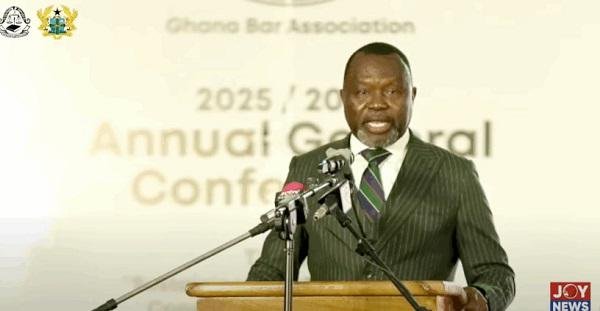
The Attorney General and Minister for Justice, Dominic Ayine, has called on the Ghana Bar Association (GBA) to remain non-partisan in the discharge of its duties.
He said the credibility of the legal profession would be at risk if the bar allowed itself to be influenced by political interests.
Speaking at the GBA 2025/ 2026 annual general conference, Dr. Ayine reminded members that their first allegiance was to the Constitution and the Republic, not to any government or opposition party.
He stressed that for over three decades, the GBA had played an important role in helping the Supreme Court interpret and enforce the law, but outside the courtroom, its advocacy had often lacked consistency.
Dr. Ayine pointed to past cases such as the 2015 petition against the former CHRAJ Chairperson, Loretta Lamptey, and the 2017 petition for the removal of Electoral Commission Chairperson, Charlotte Osei, where the bar remained silent.
He noted that the association only found its voice during the petition against former Chief Justice Gertrude Torkornoo, a stance he said coincided with the position of the opposition.
He questioned why the bar acted differently in those situations, especially since all three cases involved women of repute who held positions in key constitutional bodies.
Dr. Ayine urged the GBA to be the conscience of the republic, saying lawyers must defend the rule of law, the independence of the judiciary, and the rights of citizens regardless of which political party was in power.
He warned against inviting foreign interference in Ghana’s constitutional matters, saying international collaboration should be limited to professional exchanges and not politics.
He further encouraged the GBA to promote integrity among its members, strengthen pro bono services to support the poor, and embrace digital reforms such as e-filing and electronic court records to modernize the justice system.
According to him, the destiny of Ghana is tied to the integrity of the legal profession.
He added that if lawyers stand firm, the country will also stand firm, but if they falter, the republic will stumble.
By: Jacob Aggrey














